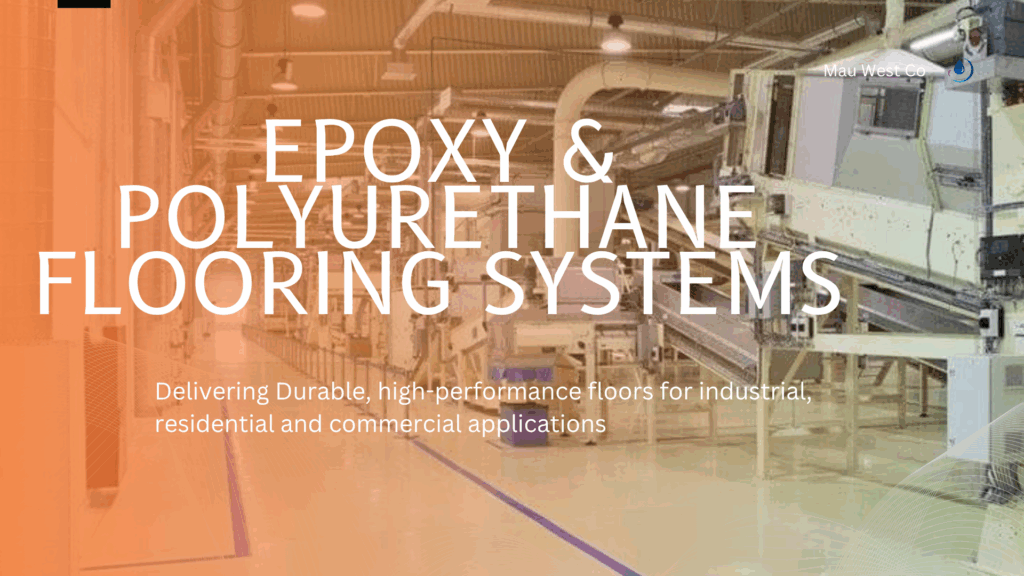07 Jul Epoxy & PU Flooring Systems: Durable Flooring Solutions For Industries in Kenyaand East Africa

Discover epoxy flooring system benefits, PU flooring system applications, and surface preparation for concrete in Kenya. Expert guide to epoxy properties and applications.
Introduction: Understanding Modern Flooring Solutions
Epoxy flooring systems have revolutionized industrial and commercial construction for over a century. When epoxy resin and hardener combine at precise ratios, they create a durable, moisture-resistant plastic that transforms ordinary concrete into high-performance surfaces.
Epoxy properties make these systems particularly valuable in Kenya’s diverse industrial landscape, from Nairobi’s manufacturing districts to Mombasa’s port facilities. Both epoxy flooring systems and PU flooring systems offer unique advantages for different applications.
Key Properties That Make Epoxy Flooring Systems Superior
Exceptional Adhesion Capabilities
Epoxy properties include outstanding adhesion to multiple substrates—metals, glass, ceramics, wood, and plastics. This wet adhesion capability means epoxy cures effectively even in humid conditions, making it ideal for Kenya’s tropical climate.
The strong adhesive bond results from:
- High stiffness of cured epoxy molecules
- Synergistic interactions between epoxy binder networks and substrate surfaces
- Minimal shrinkage during curing, particularly in solid phases
Unmatched Resistance and Stability
Chemical resistance stands as a hallmark epoxy property. These systems demonstrate:
- High corrosion resistance for steel structures and industrial applications
- Excellent chemical stability against bases (though sensitive to acids like acetic acid)
- Superior mechanical resistance including strength, hardness, and abrasion resistance
- Outstanding humidity and water resistance—crucial for Kenya’s coastal regions
- Thermal stability for temperature-sensitive applications
Physical and Processing Advantages
Many reactive epoxides feature low viscosity, enabling easier application during installation. Additional benefits include:
- Electrical insulation properties for specialized applications
- Solvent-free formulations reducing VOC emissions
- Variable pot-life options—from long working times to rapid curing
- Excellent leveling properties in coating applications
Strategic Applications for Epoxy Flooring Systems
Industrial Coating Solutions
Epoxy flooring systems excel in industrial environments requiring surface and corrosion protection. Their use is recommended by international corrosion protection standards for:
- Heavy-duty applications in shipbuilding and offshore structures
- Engineering projects like bridges and infrastructure
- Chemical processing facilities requiring solvent-borne, water-borne, or solvent-free coatings
High-Performance Adhesive Applications
Epoxy applications in Kenya include bonding various materials with minimal shrinkage during curing. The high stiffness of cured epoxy molecules creates synergistic interactions that resist water and electrolyte penetration.
Concrete Protection and Enhancement
Surface preparation for concrete becomes critical when applying epoxy systems. These applications protect concrete from:
- Chemical exposure and carbonation
- Chloride-induced deterioration
- Freeze-thaw cycling damage
- Mechanical wearing and thermal stress
Mechanical abrasion is recommended during surface preparation for concrete to ensure optimal bonding between the epoxy system and substrate.
Understanding 2-Part vs 3-Part Epoxy Systems
2-Part Epoxy Flooring Systems
Most epoxy flooring systems utilize 2-part formulations that separate:
- Part A: Epoxy resin (master lacquer component)
- Part B: Chemical hardener
This separation prevents premature curing until application, allowing controlled development of epoxy’s robust properties including excellent adhesion and chemical resistance.
3-Part System Applications
3-part epoxy flooring systems include:
- Part C: Coarser fillers and sand (aggregate package)
These aggregates are added on-site to achieve specific performance attributes like increased thickness, enhanced wear resistance, and improved load-bearing properties.
PU Flooring Systems: Complementary Technology
When to Choose PU Flooring Systems
PU flooring systems offer distinct advantages over epoxy in specific applications:
- Superior UV stability for outdoor applications
- Faster curing times even at low temperatures (down to 0°C)
- Enhanced flexibility compared to epoxy systems
- Excellent gloss retention and reduced yellowing
Strategic PU Applications
PU flooring systems excel as:
- Topcoats for outdoor applications requiring UV stability
- Corrosion protection in chemical storage tanks
- Final layers in multi-layer systems over epoxy primers
Specific Epoxy Applications in Kenya
Heavy-Duty Industrial Applications
Epoxy applications in Kenya include:
- Manufacturing facilities in Nairobi’s industrial area
- Port facilities and marine structures in Mombasa
- Food processing plants requiring hygienic surfaces
- Healthcare facilities and veterinary clinics
- Data centers and electronics manufacturing
Specialized Flooring Solutions
- Self-leveling floors using three-component systems
- ESD flooring for pharmaceutical and electronics industries
- Car park decks and underground parking areas
- Cold storage facilities requiring thermal resistance
Surface Preparation for Concrete: Critical Success Factors
Proper Preparation Techniques
Surface preparation for concrete requires:
- Mechanical abrasion to create proper surface profile
- Moisture content assessment before application
- Contamination removal including oils, dust, and debris
- Temperature and humidity monitoring during application
Primer Application Benefits
Epoxy primers provide:
- Penetration and sealing of concrete pores
- Prevention of blistering and pin-holing
- Enhanced adhesion between substrate and overlay
- First-layer protection against wear and chemical exposure
Conclusion: Choosing the Right System for Your Project
Both epoxy flooring systems and PU flooring systems offer unique advantages for Kenya’s industrial and commercial applications. Understanding epoxy properties and proper surface preparation for concrete ensures optimal performance and longevity.
For interior applications requiring chemical resistance and durability, epoxy flooring systems remain the preferred choice. When UV stability and fast curing are priorities, PU flooring systems provide superior performance.
Successful implementation depends on matching system properties to specific environmental demands and following proper installation protocols, including thorough surface preparation for concrete.
Ready to transform your concrete surfaces? Contact certified flooring contractors who understand both epoxy and PU system applications for Kenya’s unique industrial requirements.
Call: +254 721766847
Email: info@mauwest.co.ke
Location: KCB Building, Industrial Area, Nairobi.

